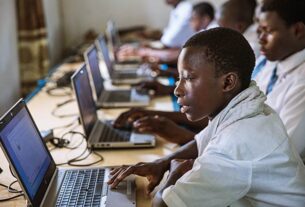Fri 11 February 2022:
World Health Organisation (WHO) Africa Regional director, Dr Matshidiso Moeti, says the continent is on course to controlling the COVID-19 pandemic.
She was speaking as the continent is about to observe two years since the first case of COVID-19 was identified on 14 February.
Since then, at least 11 million cases and 242 000 deaths as a result of the virus have been recorded in Africa.
“If the current trends hold, there is light at the end of the tunnel. As long as we remain vigilant and act intensively, particularly on vaccinations, the continent is on track for controlling the pandemic,” she said.
Moeti reflected that the past two years have been “extremely difficult” for the continent.
“But against all odds, Africa is weathering this terrible storm. The continent’s long history and experience with large outbreaks, along with an accumulation of learning and expertise since the onset of COVID-19, has seen the response become more effective with each new wave,” she said.
According to Moeti, the first wave of infections lasted 29 weeks as compared to the fourth wave which lasted for some six weeks.
Deaths as a result of the virus have declined from 2.5 deaths per 100 people in the first wave to less than one during the sixth wave.
Moeti emphasised that although the declines are a show of progress, the devastation of the pandemic still looms over the continent.
“[The] pandemic has taken a brutal toll with tens of thousands of lives lost and incalculable damage brought to African economies and communities. The World Bank estimates that the pandemic has pushed up to 40 million people in Africa into poverty.
“Controlling this pandemic must be a priority if we are also to end the destruction and disruption and begin regaining control over our lives,” she said.
The regional director said countries must continue to focus on capacity building in order to fight further infection outbreaks or waves.
“When we move into the next so called control phase of COVID-19, or living with COVID-19, the capacity countries to reduce and control incidents of infection will be key. The ability to promptly prevent, diagnose and treat cases is what will mitigate the long term consequences of future infections.
“We also need to maintain the groundswell of political will that we are now seeing in support of local manufacturing of vaccines, therapeutics and diagnostics. Increased access and affordability is the only solution to the vaccine inequity witnessed since the start of this pandemic,” she said.
Moeti said although these factors remain vital in the fight against COVID-19, vaccination remains Africa’s best defence with some 85% of Africans yet to receive a single dose.
“To reach the levels of immunity achieved in other parts of the world, vaccine uptake needs to be significantly accelerated across the region and urgently.
“A steady supply of doses is now reaching our shores so the focus needs to be on translating those into actual shots in people’s arms,” she said. –
SAnews.gov.za
_____________________________________________________________________________________________________________
FOLLOW INDEPENDENT PRESS:
TWITTER (CLICK HERE)
https://twitter.com/IpIndependent
FACEBOOK (CLICK HERE)
https://web.facebook.com/ipindependent
Think your friends would be interested? Share this story!





